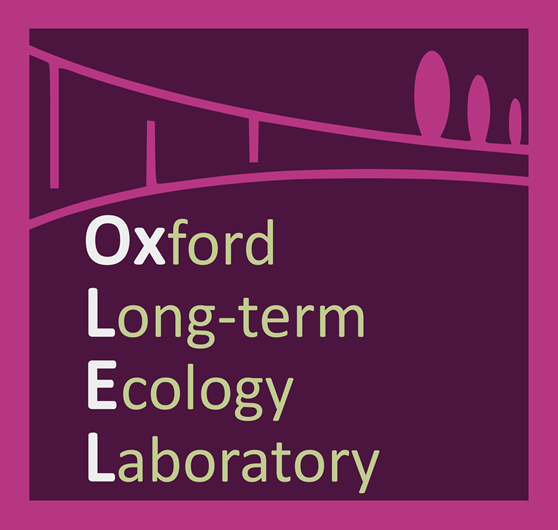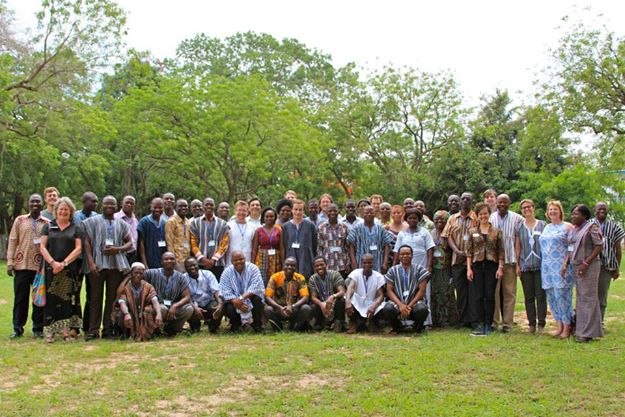Action research via a Multi-Level Integrated Adaptation Governance Workshop, Ghana
May 13, 2014
In April, Jessica Thorn and the Systemic Integrated Adaptation (SIA) returned for the fourth field trip to Northern Ghana. The main aim of the trip was to facilitate a workshop on climate change adaptation planning with small holder farmers and decision makers from across the country. In addition, she conducted a control study for her research in the relationship between well-being and ecosystem services.
The workshop ran from the 14 – 16 April 2014 in the GIMPA conference centre in Accra, Ghana with 60 participants.
Over four weeks she travelled in the Upper West region of the north of Ghana, reconnecting with the various actors at different levels in Ghana’s adaptation regime identified as crucial for addressing key issues relating to agricultural knowledge management, nutrition and health, basic education, markets and finance. These issues have been identified as fundamental to the adaptive capacity of small-holder farmers. Together with the SIA team, she led several single level focus groups and bilateral meetings to pave the way for the Multi-level Integrated Governance Workshop.
The background to this workshop is recognition that effective climate adaptation involves actions at each level from household to nation, and these actions need to be supported by appropriate policies, financial and technical resources. A major hindrance adaptation is a disconnection between experiences of adapting to climate change. This workshop took on the challenge of bringing together representatives of different groups of people, coming from very different backgrounds, education levels,and creating a safe space for the exchange of information and ideas. Specifically the aims of the workshop were to :
(1) Enhance knowledge of multi-level challenges
(2) Identify cross-level and cross-sector interactions
(3) Build networks to guide collaborative decision-making and bring together a range of societal perspectives
(4) Develop capacity to deal with key socio-economic uncertainties, and learn about scenarios of climate and social change
(5) Gain insights to address challenges and improve efficiency, effectiveness, equity, and sustainability of adaptation
(6) Develop tangible and implementable actions
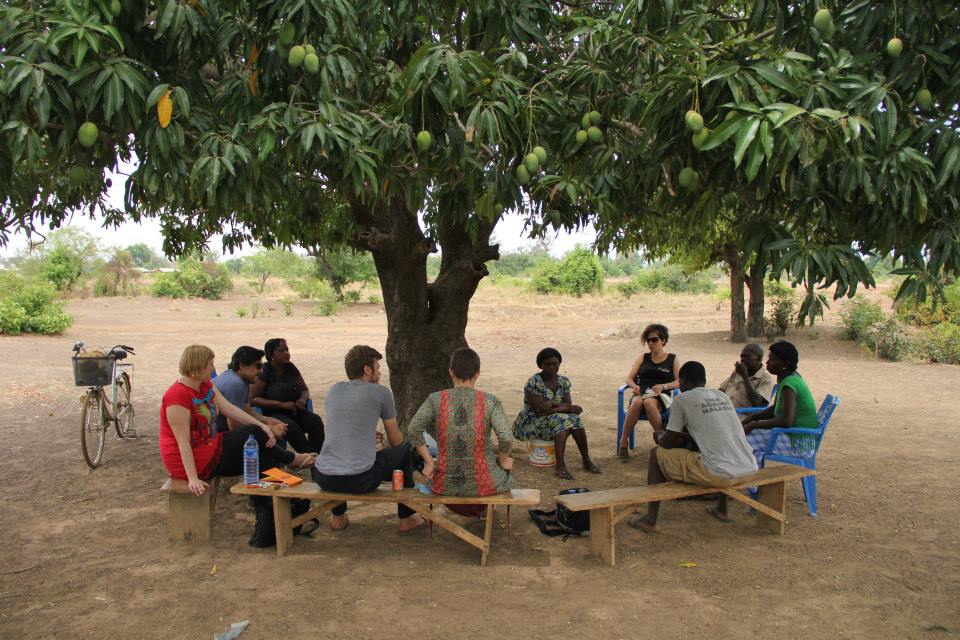
Meeting in Orbili village on the border of Burkina Faso regarding the impact of pest infestation on dry season vegetable crops.
Summary of the workshop – 14 – 16 April, Accra Ghana
(The original version of this article was written Adeyemi Ademiluyi and published on the Systemic Integrated Adaptation facebook page. )
“When I work with the community we feel that they have nothing and we are going there to tell them something… The process was great and very helpful; we will certainly be replicating some of it. I came expecting to hear some lectures about climate change but when I arrived it was surprising that it was actually we that were doing all of the talking; not you guys. I will certainly take that with me back to the community.”
Mary Mwinsigteng, the Lawra District Assembly Gender Officer at the close of the workshop.
The SIA research team welcomed decision makers in climate change adaptation from village, district, regional and national levels to the Multi-Level Integrated Adaptation Governance Workshop, which ran April 14th to April 16th 2014 at Ghana Institute of Management and Public Administration (GIMPA) in Accra. The participants travelled from Orbili, Lawra, Wa, Tamale and throughout Accra to come together, share life experience and create a mutual and comprehensive understanding of the processes involved in climate change adaptation from each of their perspectives. From this they identified opportunities to achieve greater alignment, and targeted flows of knowledge and resources to improve the efficiency and effectiveness of climate adaptation in Ghana. The workshop was facilitated in collaboration with the Council for Scientific Industrial Research Animal Research Institute (CSIR-ARI), and funded by Climate Change Agriculture and Food Security (CCAFS) West Africa.
The SIA research team welcomed decision makers in climate change adaptation from village, district, regional and national levels to the Multi-Level Integrated Adaptation Governance Workshop, which ran April 14th to April 16th 2014 at Ghana Institute of Management and Public Administration (GIMPA) in Accra. The participants travelled from Orbili, Lawra, Wa, Tamale and throughout Accra to come together, share life experience and create a mutual and comprehensive understanding of the processes involved in climate change adaptation from each of their perspectives. From this they identified opportunities to achieve greater alignment, and targeted flows of knowledge and resources to improve the efficiency and effectiveness of climate adaptation in Ghana. The workshop was facilitated in collaboration with the Council for Scientific Industrial Research Animal Research Institute (CSIR-ARI), and funded by Climate Change Agriculture and Food Security (CCAFS) West Africa.
Day One
The first commenced with an opening ceremony from the partner organization and funders. speed-meeting activity, the group very quickly got into the spirit of both sharing with one another and learning from one another. Leading straight on from speed-meeting was a story telling activity. In the design of the workshop, the SIA team made explicit both the rational and emotional aims of each activity. The rational aims identified were to sensitise all participants to the context of the others, to broaden awareness and to help each participant consider new obstacles. The emotional aims were to create an opening for people to begin sharing and considering multiple perspectives; to build tolerance for ambiguity; and to make people feel more secure with uncertainty. In short, the first activities aimed to move participants from frustration (with uncertainty and difference) to enlightenment (comfort with uncertainty and multiple perspectives). The 4 multi-level break-out groups delved deep into each others’ lives as people expressed times when they felt proud, frustrated, happy or surprised. “I think its extraordinary how much people are participating and enjoying it” proclaimed one participant from the national level.
After lunch, the participants began a rich picture drawing activity. The rational aim of the rich pictures was to provide a detailed visualization of what’s going on at each level. The emotional aim was to create empathy by capturing and sharing multiple perspectives and encouraging participants to acknowledge the diversity and complexity of multiple perspectives. The community, district, regional and national level actors were divided into groups comprising all other participants from their level. Each group brainstormed features, challenges, tools and sources of pride and drew representations of them. Even within single-governance level groups, there were several contentious issues that created animated discussion.
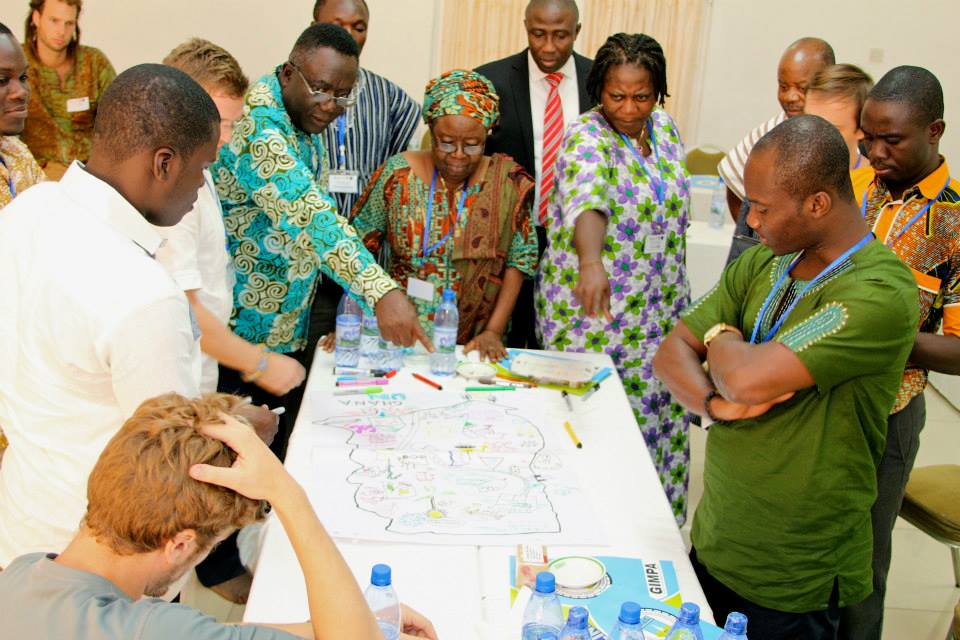
A rich picture methodology was used that arises from Systems Thinking science, and disconnects drawn on a map to represent key bottlenecks in water and land management, finances and markets, basic literacy and nutrition and agricultural knowledge management.
Day Two
Rich pictures drawn in the previous day representing the village-to-national levels and the range of their influences. were printed on A3 papers and were joined to make one large rich picture. Participants were split into multi-level groups under the four themes: (1) health, nutrition and basic education; (2) land and water management; (3) markets and finance and (4) agricultural knowledge management. They then began to discuss how the different adaptation actions connect from bottom to top (community to national level) and drew lines to represent these connection, green for well-functioning, blue for existent, but not functioning perfectly and red for non-existent. With the fast paced discussion, each group brainstormed ideas and clustered possible solutions to improve or create the blue or red links. The groups then selected one solution, on the basis of priority and feasibility, to develop a detailed step-by-step plan of action.
Day Three
The final day started with a discussion of the four scenarios that came out of the CCAFS Regional Scenario Workshop for West Africa. The two axes used were government vs. private and civil, and short term vs. long term planning. The multi-level, mixed theme groups then tested each of the four detailed plans developed during the previous day against one scenario. As it is sometimes explained, stress testing plans through scenarios is similar to test driving a car – regardless of what conditions a car is expected to be driven in, it is tested in extreme conditions to understand how it will perform. Similarly, the actions specified by each of the theme groups were tested in multiple plausible scenarios.
As the different actions were put to the test in multiple scenarios, they were each adapted to make them more robust to a wide variety of plausible futures. To ensure the actions would be taken forward post-workshop, a tool was used which allows individuals or institutions to volunteer for the followed roles: Champion, Approval, Consulted, Informed and Time (due) (CACIT table). Running through each activity, the participants volunteered to take on lead roles and identify who else should be involved to actualize the plans. “Everybody is excited, active and enthusiastic, you would not believe it was day 3 of a work shop” one participant remarked. It was clear, by the consistently high level of participation in all levels of decision making, that the value and potential of this process was understood by all present.
The participants have made concrete commitments to take the work forward and replicate the process throughout Ghana and elsewhere in West Africa, and have walked away motivated and committed to change.
Latest News
Vector Atlas Engagement and Partnership Meeting, December 2022

The Vector Atlas team is looking forward to welcoming representatives from over 15 African countries to the first Engagement and Partnership Meeting to be held at the International Centre ... Continue reading
Seeing roots from space
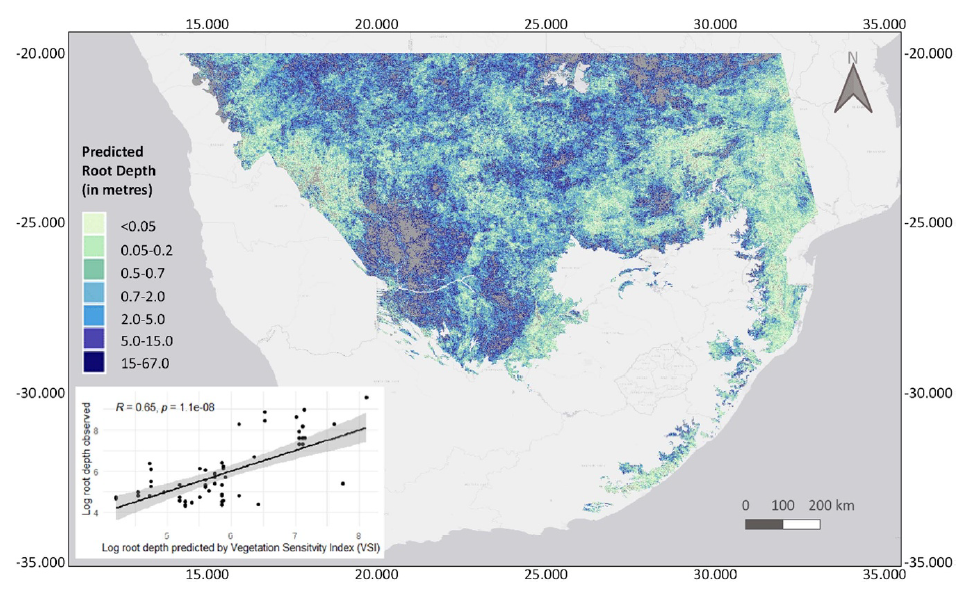
A new study led by Dr Nicola Kühn during her DPhil associated with the lab titled “Seeing roots from space: aboveground fingerprints of root depth in vegetation sensitivity to ... Continue reading
Vector Atlas Spatial Modelling Workshop, November-December 2022
We are excited to be holding the Vector Atlas Species Distribution Modelling Training Course at the International Centre of Insect Physiology and Ecology (icipe) in Nairobi, Kenya, 30 November ... Continue reading
Vector Atlas at the 8th Annual PAMCA conference

The Vector Atlas team had a great time at the 8th Annual Pan-African Mosquito Control Association (PAMCA) conference held in Kigali, Rwanda, from 26 to 28 September 2022. Excellent ... Continue reading
Vector Atlas Kick-off Meeting

The international Vector Atlas team gathered at the International Centre of Insect Physiology and Ecology (icipe) Duduville campus in Nairobi from 4 to 8 July 2022 to celebrate the launch ... Continue reading
